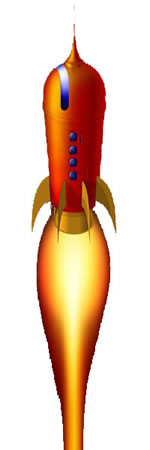Scratch TCC Special Original Design / Scratch Built
Scratch - TCC Special {Scratch}
Contributed by Ross Ohmen
| Published: | 2010-01-14 |
| Manufacturer: | Scratch |
 Brief:
Brief:
Futuristic 8-finned, stubby, rocket based on a picture in Tripoli Central California's (TCC) web site.
Construction:
Parts List:
- 1 - BT80 Nose Cone - Fat Boy Style
- 1 - BT80 Body Tube - Approx 10"
- 1 - BT50 Motor Tube -3"
- 2 - CR 5080 Centering Rings
- 1 - 18" of Kevlar shock cord.
- 1 - 36" shock cord
- 1 - 8" x 8" Nomex cloth for parachute protection
- 1 - 18" Parachute
- 1 - BT50 Thrust Ring
- 3/32" Ply for the 8 fins.
- Card stock for the motor bell
- 3/16" launch lug - 2" long.
- 1 - 4" x 1.25" x 1.25" Hardwood Block, with center 1/4" Dowel.
- Drill press or lathe to turn the nose tip on.
- Screw to mount nosecone tip.
- Screw Eye to mount the shock cord
- Lead shot, or other nose weight.
Body amd Fin Assembly:
Note that there's no motor retention built into the rocket. I suggest friction fit, as a hook would spoil the look...
To start the build, glue the thrust ring and CR5080s onto the motor tube.
Drill a 1/8" hole in the forward centering ring, for the Kevlar Shock cord. Put the cord through, and knot it. Glue it flush to the end of CR, so the cord is forward of the engine assembly, (and only the knot is in the middle of it).
Glue the engine mount in the BT80, with the aft end flush to the body tube.
Cut out the 8 fins. I use a jigsaw mounted upside down on a routing table - works great.
Group all eight fins, and sand until they are even. Note that the ends are pointy, and will need to be handled carefully. I put a minor bevel on the edges (other than the end against the body tube, of course!)
Generate a 2.6" x 8 fin wrap. Cut it out, and mark the fin positions on the body tube.
Glue the fins on the body tube (flush to the end of the BT). I like to use CA to tack the fins on. Glue on the launch lug, then make sturdy fin fillets of Titebond or epoxy. Yes, there's a lot of fillets. I recommending putting CA on the fin tips to strengthen them.
Trace or print the engine bell on the cardboard stock. Cut it out, and glue into the conical shape. Carefully glue it on the rear centering ring. Give this a good fillet.
Nose Cone Assembly:
Put the nose block in your lathe or drill press, and turn it. I used a second hand-held drill with a sanding disk to rough the block, then nail files and sand paper to get the final shape. Note that the base end must be slightly indented to mount on the tip of the Fat Boy Nosecone.
When smooth and correctly shaped, cut off the dowel. Drill a 3/32" hole in the exact center of the dowel stub.
Locate the exact tip of the Fat Boy nosecone. Drill a corresponding 3/32" hole. (I don't have a technique to do this - I just "eyeballed" really well.) Use the screw to mount the nose tip to the Fat Boy nosecone.
Weigh the nose cone, with the screw eye. Add nose weight to make 2.0 oz. Don't forget the weight of the epoxy. Attach the shock cord to the screw eye, add the nose weight to the nose cone, mix the epoxy and pour it in the nose cone. (Use enough to lock the nose weight in place.)Carefully place the screw eye in the slurry, and put aside to dry.
Finishing:
Attach the nosecone and parachute to the long shock cord, and attach this to the shock cord to the Kevlar shock cord.
Note that BT80 is kinda thin for this app, and you may wish to make a "tape lozenge/fireball" where the shock cord touches the body tube. Take 14" of 1" tape. 1/2" in from one end, stick the tape to shock cord. Go 1/2" past the shock cord, and fold the tape over on itself. Cross the shock cord 1/2", and fold it back over on itself again. Repeat 14 times. The lozenge should help protect the BT80.
 Painting:
Painting:
Seal all the wood parts, with several coats of sealer, sanding between.
Give a nice, even coat of sandable primer, and sand away any blemishes. Repeat until smooth.
Paint the fins and engine nozzle. Let it dry.
Mask off the fins and engine nozzle.
Paint the body.
Mask off the cabin windows and door. Auto detailing tape is good for the front windshield. Take your time and get it right.
The details are complex, but worth it.
Flight:
I've flown this rocket about 10 times on D12-5's and 18 mm D's (with adapter), to cool, high flights. It's forgiving, and could probably be flown with C11-3's, and even an E9-6 or E11-3.
Preparation is straightforward. The Nomex makes recovery and reloading a breeze.
Boost is straight up, and goes pretty high for a draggy 2.6" rocket. Looks great!
Recovery:
Note that a 7-second delay (as in D13-7) is too long, and should be shortened. Other than that, recovery is easy, usually close, and looks great.
One of my recoveries landed on one fin (in mud), and stuck the nose cone tip in a cow pie!
Summary:
Pros - A real head-turner at launches.
Cons - The painting took a while. The fin tips are fragile, and should be protected.
Other:
Turning the nose spike was easy! Just have the desired profile before you start..
 |
 |